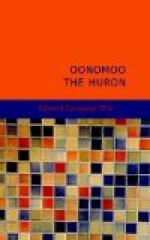“Miamis on shore wait to make Oonomoo a prisoner.”
“Oonomoo is the friend of Heigon, and the Miamis will not injure him.”
[Illustration: But Oonomoo and the Miami had whipped out their knives.]
The Huron hesitated no longer, but the next moment stood beside the Miami on the broad mass of stone. Heigon gave a short peculiar whoop, which was instantly followed by the appearance of the other canoe with its four inmates, who impelled it forward with great rapidity, and in almost a twinkling were also upon the rock. Each held a glittering knife in hand, and they gazed upon their victim with exulting eyes, who stood firm, unmoved, and returned their glances with as proud and defiant an air as a king would have looked upon the vassals beneath him. They were about to proceed to violence, when Heigon simply said: “He is my friend.” Instantly every knife was sheathed, and the gloating expression of the Miamis changed to one of interest and pleasure. They gathered more closely around the Huron, and looked to their companion for some further explanation.
“When the snow was upon the ground,” said he, “Heigon was hunting, and he became weak and feeble, like an old man, or the child that cannot walk.[1] The snow came down till it covered the rocks like this, and Heigon grew weaker and feebler until he could walk no further, and lay down in the snow to die. When he was covered over, and the Great Spirit was about to take him to himself, another Indian came that way. He was Heigon’s enemy, but he lifted him to his feet and brushed the snow from his face and limbs and poured his fire-water down his throat. He dug the snow away until he came to the dry leaves, and then he kindled a fire to warm Heigon by. He stayed by him all night, and in the morning Heigon was strong and a man again. When he went away, he asked the Indian his name. It was Oonomoo, the Huron. He stands by us, and is now in our power.”
The eyes of the Miamis fairly sparkled as they listened to this narration of their comrade, and they looked upon the far-famed Huron with feelings only of friendship and admiration. He had been considered for years as one of the deadliest enemies of the Miamis, and his capture or death by them would have been an exploit that would have descended through tradition to the last remnant of their people. Fully sensible of this, this same Huron had come upon one of their most distinguished warriors when he was as helpless as an infant, and could have been scalped by a mere child. But the magnanimous savage had acted the part of a good Samaritan, feeding and warming him and sending him on his way in the morning, refreshed and strengthened. Such a deed as this could never be forgotten, either by the recipient or those of his tribe to whom it became known.
During the narrative the Huron stood with arms folded, and as insensible to the praises of Heigon as if he had not uttered a syllable since the advent of his companions. He who appeared to be the leading warrior now asked:




